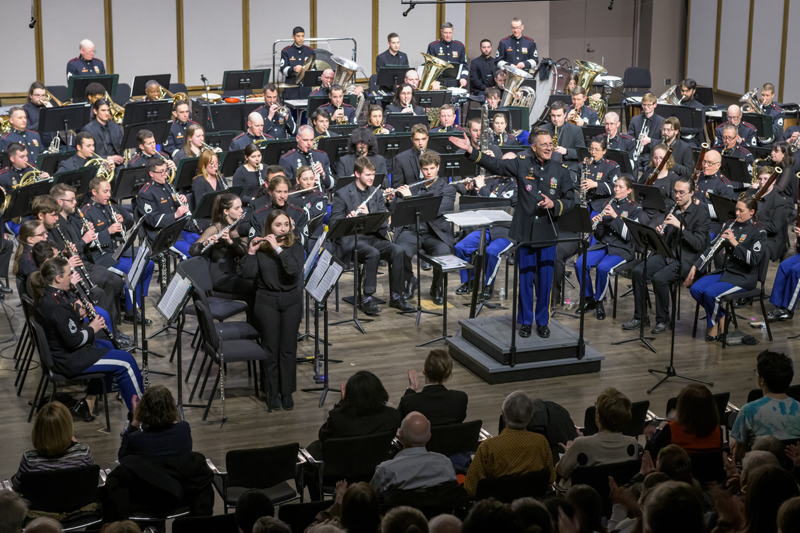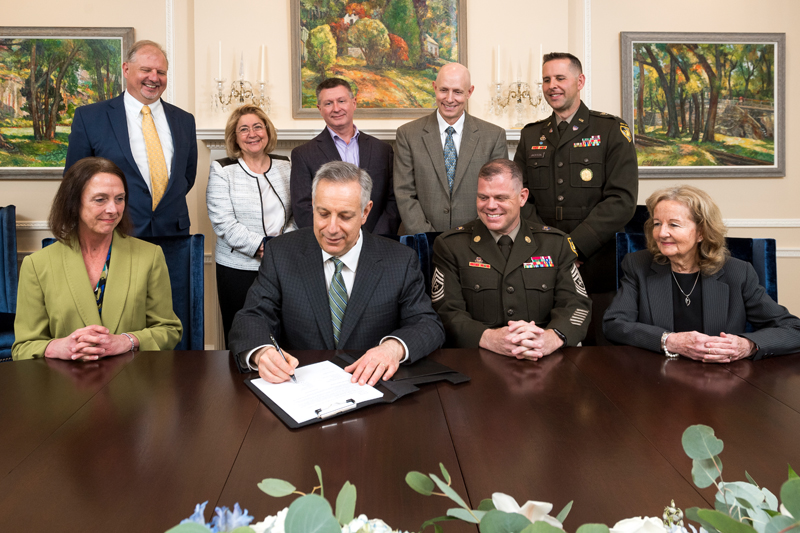


(Re)Hearing Music
Photos by Evan Krape May 08, 2023
UD launches five-year research partnership with the U.S. Military Academy at West Point
The audience was typical for a School of Music concert — a mix of University students, friends of the performers, parents and community music lovers. And for much of the event, they behaved like a typical audience at a classical music concert — listening politely and applauding enthusiastically. However, for some, the collaborative concert was far from typical, as they had opted to participate in a research study tracking how audiences’ emotional response to music is influenced by preconceptions.
The program combined patriotic and classical music, with pieces by Keki Abe, Gustav Holst, Igor Stravinsky and John Philip Sousa. Audience members who had opted to participate in the study were asked to download an emotion-tracker app that used a Positive and Negative Affect Schedule (PANAS scale). At four points during the evening, they used the app to track their emotional response to the music being played.
The concert was the first project in a planned five-year research initiative between the University of Delaware and the United States Military Academy’s West Point Music Research Center (WPMRC), whose mission focuses on increasing “the knowledge of music as a ubiquitous component of cultural and national identity.”
“Music is such a vital element of a healthy, thriving community, and we are proud and excited to partner with West Point on this innovative research project,” UD President Dennis Assanis said. “This collaboration will enable UD to continue expanding its own interdisciplinary research in a variety of fields while also enhancing WPMRC’s important work.”
![CAS-Music-West_Point-Wind_Ensemble-CRADA_Concert-030323 The UD Wind Ensemble and the West Point Band perform together in the University’s Puglisi Orchestra Hall for “Let Freedom Ring,” a concert for general attendance as well as a research study on how audiences perceive music based on the group performing it. The concert is part of a Cooperative Research And Development Agreement (CRADA) between the University of Delaware and West Point around projects that focus on sound and music and the impact of arts on wellbeing and health.
USAGE NOTE: Department of Defense material (including logos and seals shown on uniforms) “may not be used in a manner that could imply endorsement of an individual, for-profit business, nonprofit organization, any other non-federal entity (including DoD contractors), product, or service, or any political party or candidate for partisan political office. This applies to both domestic and international users. Endorsement of a non-federal entity, event, product, service, or enterprise may be neither stated nor implied. All users of DoD VI [Visual Information] must display this non-DoD endorsement disclaimer except that commercial items are not required to use the full disclaimer when it is impracticable:
“The appearance of U.S. Department of Defense (DoD) visual information does not imply or constitute DoD endorsement.”” [dimoc.mil]
For more information: https://www.defense.gov/Resources/Branding-and-Trademarks/](/udaily/2023/may/crada-music-concert-research-partnership-west-point/_jcr_content/par_col_8_udel/textimage.coreimg.jpeg/1683567997913/157-music-west-point-crada-vertical.jpeg)
The March 3 concert marked the start of the initiative, formally known as a Cooperative Research and Development Agreement (CRADA). Its scope will extend throughout campus beyond the School of Music. Additional research plans include partnerships with the College of Health Sciences to explore the effects of music for the performance optimization of military and athletic teams, the use of music as a tool for recovery from minor traumatic brain injuries and even music’s interaction with broadcast media and information theory.
Brigadier General Shane R. Reeves, dean of the academic board at West Point, adds that this is a new paradigm in musical research. “This exciting opportunity will advance our understanding of the impacts of music on the human condition. We look forward to strengthening our research partnership with the University of Delaware over the coming years.”
About the CRADA
A Cooperative Research and Development Agreement (CRADA) is a formal written agreement of limited duration and scope between a government and non-government agency.
After the initial COVID-19 shutdown in 2020, as organizations began exploring how to safely resume live music performances, the WPMRC was studying aerosol production and how air particulates were dispersed by various instruments and while singing. Associate Dean for the Arts Suzanne Burton and School of Music Interim Director Mark Clodfelter discussed the findings with Sergeant Major Denver Dill and Chief Warrant Officer T.J. Jackson, co-founders of the WPMRC.
“We started having conversations about music, music development and sound,” Burton says. “Because it’s about music, but it’s not all about music. It’s also about sound and sonic branding.” Think of the sound you hear when you open Netflix or Law and Order’s iconic ‘dun-dun.’
Dr. Burton, Sgt. Maj. Dill and Chief Jackson kept discussing possibilities for a research partnership, with WPMRC eventually presenting a proposal to UD’s Research Council. Through conversations with Kathleen Matt, retired dean of the College of Health Sciences (CHS) and Charles “Buz” Swanik, deputy dean of CHS, the CRADA took form with suggested ideas for performance optimization, as well as health and wellness related studies.
After several months of negotiations, the current CRADA was signed in 2022 by President Assanis and USMA at West Point Superintendent LTG Darryl A. Williams.
This is the third CRADA the University has signed with partners in recent years. UD signed a CRADA in 2019 on behalf of the National Institute for Innovation in Manufacturing Biopharmaceuticals (NIIMBL), which has its headquarters on STAR Campus. Before that, then University president Patrick Harker signed a CRADA in January 2010 for an agreement between UD and the U.S. Army at Aberdeen Proving Ground (APG).

Contact Us
Have a UDaily story idea?
Contact us at ocm@udel.edu
Members of the press
Contact us at 302-831-NEWS or visit the Media Relations website

